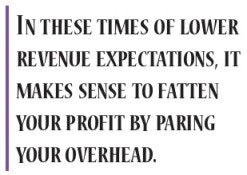Before signing a new lease, take a long look at the fine print

Your property lease is up for renewal. Polish your reading glasses and sharpen your pencils: It's time to fine-tune the fine print to get more-favorable terms. Rent, after all, is one of your biggest expenses. In these times of lower revenue expectations, it makes sense to fatten your profit by paring your overhead.
"Many people believe that if their space needs are being met, come renewal time they should just sign on the bottom line," says Myra Maher-Martin, vice president of Joe Foster Company, a Dallas-based real estate brokerage and advisory services company operating nationwide. "Strategically, that is not in their best interest."
Want a better deal? Read on.
1. Check the terms of your renewal options. Does your lease provide for a renewal option? This is the first thing to find out. If you have already renewed your lease once, there may be no additional automatic options left, which can pose problems.
"Sometimes people negotiate better renewal-option terms," says Susan Hays, a principal with the Hartford, Conn.-based law firm of Updike, Kelly and Spellacy. "They may say, 'I would like a five-year lease and the option to renew for an additional two five-year periods.' If they have a really good site, this is a way to lock the landlord into allowing them to stay longer."
Landlords would rather have a single 10-year lease than a five-year lease with an option to renew, Hays points out. However, they may consider alternatives if you will agree to a rent escalator that guarantees them regular increases in the future. As with any other lease detail, options are matters of give and take.
Pay attention to the time frame in the renewal option. Be aware of any demands that you notify your landlord of intent to renew before a certain number of months prior to lease expiration.
2. Find a "walk-away alternative" before negotiating. If you are going to negotiate from a position of strength, you need to know you can walk away from your current location. "Few tenants take time to get a walk-away alternative," says Maher-Martin. "But it's crucial." Besides leverage, there's another benefit to having an alternative location: you can visualize your negotiation as an entirely new piece of business rather than an alteration of a previous agreement. "You want to consider every critical term of your lease a negotiable item," says Maher-Martin.
One final point: Don't try to fake your walk-away alternative. You must always have a real one for it to work - otherwise you will pull your punches during negotiations, says Maher-Martin.
3. Watch for unfair escalation clauses. Outside of the base rental rate, the stickiest part of a lease is the operating-expenses escalation clause. Sometimes called "pass-through clauses," these call for your rent to increase according to a formula that determines your prorated share of the actual increases in a building's operating expenses.
Unfortunately, such clauses often include so many types of operating expenses that they result in unexpected liabilities for tenants. In your negotiations, attempt to eliminate expenses that relate to the risks of ownership rather than of leasing. These include marketing costs for the building, and amortization of maintenance and energy conservation and cleaning equipment. Also watch for landlords who manage more than one building but assess all of their overhead expenses to the tenants of one building.
4. Obtain "finish allowances." Your property has undergone some wear and tear over the years and could use a facelift. What kind of money will the landlord devote to this purpose. "The landlord will have budgeted some money to fix up your space in the event you decide to leave," says Maher-Martin. "How much of that money can you obtain for repainting and refinishing?"
5. Change base year to the current year. Here's another tip that relates to operating expenses. Operating-expense escalation rates replicate the increases in such costs over a "base year," which is generally the year your lease began. "When you do renew, make sure the base year is adjusted to the current year, rather than to some former date," says Mark Fajack, a vice president at Cost Analysis Management Co. (CAMCO) of Cincinnati.
6. Beware a change from "gross lease" to "net lease." In a "gross lease," the landlord bears all of the risk for repairs and maintenance. In a "net lease," the tenant pays for a portion. Know which kind of lease you have. And beware an unannounced change in the lease that can leave you liable for thousands of dollars in additional expenses.
7. Ensure your right to audit operating expenses. If you've agreed to pay a portion of the operating expenses for your property, how can you make sure the numbers from your landlord are accurate? Make sure your lease contains language that allows you to audit bills in a timely fashion.
You want to be able to audit these expenses - which may include janitorial costs, insurance, administrative costs to run the building, utilities, real-estate taxes and a host of other line items - because in some cases they can add up to 30 to 40 percent of your total rent. "Given the variety of what may be included, it's important to negotiate a lease that itemizes exactly what you will be paying for," says Bob Wiesner, senior partner at The Robert Thomas Group, a Chicago-based real estate lease-auditing firm.
Wiesner advises against signing leases that are overly restrictive in terms of audit rights. "A lease may state that operating expenses must be audited within 10 days of the issuance of a statement," he says. "We find this is impractical for most tenants." What time frame should you negotiate. "I wouldn't sign anything for under three months, and I think three years is reasonable," says Wiesner.
8. Don't waive your right to obtain money due. As part of your renewal, you may be asked to sign an attachment to the effect that the landlord does not owe you any money. "If signed improperly, this can hurt you," warns Wiesner. "I've seen cases in which landlords have owed tenants money that has been waived away."
Prior to signing, perform due diligence to make sure you are not owed anything. Some categories to watch: overpayments on prior leases, tenant improvement allowances, and "free rent" from your previous lease. The "free rent" amounts can be easy to overlook if the specified months are staggered. For example, suppose your landlord had originally sweetened a five-year lease offer by specifying two months free of charge. At the same time, though, the landlord ensured that you would stay for the long term by assigning those rent-free periods as months 48 and 49. It's up to you to make sure you do not pay for those months, or, if you mistakenly do so, do not waive your right for reimbursement later.
9. Beware holdover clauses. Holdover clauses anticipate a situation in which you intend to move to a new location but are unable to do so on time. A holdover may come about through no fault of your own - all of the moving companies, for example, could go on strike before moving day - but if your lease calls for onerous payments to the landlord in such a case, your profits could be hit hard.
Suppose another tenant cannot move in on time because you have not moved out, and that as a result the new tenant cancels the lease. Some contracts go so far as to stipulate that the vacating tenant pay double the monthly rent, as well as damages to the landlord. Get any such clause out of the contract. Alternatively, you may be able to get the penalty reduced to 125 percent of the monthly rent.
10. Eliminate personal guarantees. Maybe when your business was young, your landlord would not offer a lease without a personal guarantee. Times have changed, now that you have proven yourself. "It's easy to forget the existence of these guarantees, and that you are now exposed for more money because the rent has gone up," says Maher-Martin. "Negotiate the clause out."
If there is an eleventh tip, it is this: Plan ahead. Thoroughly analyze your contract, and don't sign on the bottom line until you get the best deal possible. The net result will be more profit for you and a landlord who is probably better off with a happy tenant who decides to stay for the long term rather than look for better conditions elsewhere.




































